
Are you interested in studying contemporary population issues like ageing, migration and global population growth? In the master Population Studies students learn theories, methods and skills required to become a versatile demographer.
Essential to understanding population dynamics is the study of
people's demographic behaviour, such as birth, health, migration,
and death. The master programme focuses on these demographic
events, on how decision-making regarding these life events is
influenced by the economic, societal, cultural, and geographical
context, and on how these demographic events have an impact on
population-level trends.
You will learn about:
* Contemporary population issues as population ageing,
integration of migrants, health inequalities and global population
growth
* Individual decision-making processes behind demographic events,
such as family formation, residential choices and health care
use
* Collecting and interpreting demographic data
* Methods and techniques to analyse demographic data: life tables,
population projections, advanced statistical analysis, and
qualitative research methods
* Population policies and intervention programmes
The field of Population Studies reflects on and deals with contemporary demographic topics and related societal issues. The study is simultaneously concrete and broad.
The Master in Population Studies is also interesting for mid-career professionals working at, for example, statistical offices or demographic departments of government agencies.
In addition to the one-year Master Population Studies, we also offer the two-year research master specialisation Population Studies and two dual degree programmes: with the University of Cologne in Germany ( Demography and Social Inequality ) and with the Universitat Pompeu Fabra in Barcelona, Spain ( Social Demography ).
Our programme is unique in its combination of analytical and social demography, its combination of quantitative and qualitative research methods, and its international, multidisciplinary and strong scientific orientation. Interactive ways of teaching are being employed by very enthusiastic and dedicated teachers. Within the Netherlands, Groningen is the only university offering an MSC in Population Studies.
| Semesters | ||||
|---|---|---|---|---|
| CoursesCourse Catalog > | 1a | 1b | 2a | 2b |
| Demographic Data and Analysis (5 EC) | ||||
| Population, Health and Place (5 EC) | ||||
| Qualitative Research for Policy & Practice (5 EC) | ||||
| Migration, Families and Households (5 EC) | ||||
| Optional Courses (5 EC) | ||||
| Population Projections & Sustainability (5 EC) | ||||
| Advanced Statistical Analysis (5 EC) | ||||
| Optional Courses (5 EC) | ||||
| Master's Thesis Population Studies (20 EC) | ||||
For more information about this programme, please visit http://www.rug.nl/frw/education/master-info-frw/courses-master-population-studies
| Programme options |
|---|
| DDM Demography and Social Inequality (specialization) What impact did the recent economic crisis have on individuals' living and working conditions, on individuals' study and career choices, on social inequalities and social cohesion? The Dual Master's Programme in Demography and Social Inequality gives first-class students the opportunity to benefit from the outstanding expertise of two top-ranking universities. Participants of the programme spend one year studying at each university and graduate with two master's degrees: a Master of Sciences in Sociology and Social Research issued by the University of Cologne and a Master of Science in Population Studies issued by the University of Groningen in the Netherlands.The international master's programme focuses on demographic change, population dynamics and the challenges faced by modern societies due to increasing life expectancy, decreasing birth rates and migration. Students will learn to apply advanced social research methods and data analysis, providing necessary tools to deal with current issues such as ageing, social inequality, family, integration and education, among others. Students will have the possibility of acquiring in-depth knowledge of these topics and developing interdisciplinary research skills.For Dutch students, DAAD scholarships are available for the first year in Germany, see: https://bit.ly/duitsland-beurzen |
| DDM Social Demography (specialization) What impact did the recent economic crisis have on individuals' living and working conditions, on individuals' study and career choices, on social inequalities and social cohesion? The International Master in Social Demography is a Dual Degree Programme offered jointly by the Department of Political and Social Sciences of the Universitat Pompeu Fabra (UPF) of Barcelona and the Faculty of Spatial Sciences of the University of Groningen (UG). After successful completion of the programme, students end up with two official diplomas: Master of Research in Sociology and Demography, issued by the University Pompeu Fabra, and Master of Science in Population Studies, issued by the University of Groningen.The double degree programme, which is entirely offered in English, combines the strengths of two of the highest-ranked Social Science Departments in Europe to offer high level research training in Sociology and Demography.The programme emphasizes the study of both advanced and developing societies from a unique interdisciplinary and dynamic perspective.See the flyer: http://www.rug.nl/frw/education/more-education/FlyerDDMSocialDemography.pdf |
| Specific requirements | More information |
|---|---|
| previous education |
We offer a pre-master programme for students who are not directly admissible to this master. For admission requirements of the pre-master see: https://www.rug.nl/frw/education/pre-master/ |
| language test |
English on VWO level or one of the following equivalents:
A prospective student can always apply for an exemption from the English language test. The student needs to explain, and if required show proof of, why an exemption would be justified. It is up to the Admission Board to decide whether an exemption will be granted or not. |
| other admission requirements |
Academic Bachelor degree with some background knowledge in Population Studies, incl. at least 10 ECTS in statistics or equivalent statistical knowledge, 5 ECTS in research method skills and 15 ECTS in demography-related thematic knowledge. Applicants are advised to follow (courses of) the Minor in Population Studies before entering the Master Programme. |
| Study programme | Organization | Transition |
|---|---|---|
| All Universities of applied sciences |
Via a pre-master More information:For more information about the pre-master please see https://www.rug.nl/frw/education/pre-master/ |
| Study programme | Organization | Transition |
|---|---|---|
| Cultural Anthropology and Development Sociology | All Research universities |
Additional requirements Additional requirements:
10 ECTS in statistics and 5 ECTS in knowledge of research method skills required |
| Liberal Arts and Sciences | All Research universities |
Additional requirements Additional requirements:
10 ECTS in statistics and 5 ECTS in knowledge of research method skills required |
| International Relations and International Organization | All Research universities |
Additional requirements Additional requirements:
10 ECTS in statistics and 5 ECTS in knowledge of research method skills required |
| Human Geography and Planning | All Research universities |
Additional requirements Additional requirements:
10 ECTS in statistics and 5 ECTS in knowledge of research method skills required |
| Spatial Planning and Design | All Research universities |
Additional requirements Additional requirements:
10 ECTS in statistics and 5 ECTS in knowledge of research method skills required |
| Economie | All Research universities |
Additional requirements Additional requirements:
10 ECTS in statistics and 5 ECTS in knowledge of research method skills required |
| Sociology | All Research universities |
Additional requirements Additional requirements:
10 ECTS in statistics and 5 ECTS in knowledge of research method skills required |
| Type of student | Deadline | Start course |
|---|---|---|
| Dutch students | 15 August 2026 | 01 September 2026 |
| 15 January 2027 | 01 February 2027 | |
| 15 August 2027 | 01 September 2027 | |
| EU/EEA students | 01 May 2026 | 01 September 2026 |
| 01 November 2026 | 01 February 2027 | |
| 01 May 2027 | 01 September 2027 | |
| 01 November 2027 | 01 February 2028 | |
| non-EU/EEA students | 01 May 2026 | 01 September 2026 |
| 01 November 2026 | 01 February 2027 | |
| 01 May 2027 | 01 September 2027 | |
| 01 November 2027 | 01 February 2028 |
If you are considering applying for a start in February, please know that this has practical implications for your studies. We advise a start in September as the programme is better suited for a September start. Before applying for a February start in our programme and paying the application fee for students with a foreign diploma, we advise you to discuss your application with one of our Study Advisors (study.advice.fss rug.nl)
| Specific requirements | More information |
|---|---|
| previous education |
If you are not directly admissible you can follow a pre-master programme. See more information in the pre-master guide: https://www.rug.nl/frw/education/pre-master |
| language test |
English on VWO level or one of the following equivalents:
A prospective student can always apply for an exemption from the English language test. The student needs to explain, and if required show proof of, why an exemption would be justified. It is up to the Admission Board to decide whether an exemption will be granted or not. |
| other admission requirements |
Academic Bachelor degree with some background knowledge in Population Studies, incl. at least 10 ECTS in statistics or equivalent statistical knowledge, 5 ECTS in research method skills and 15 ECTS in demography-related thematic knowledge. Applicants are advised to follow (courses of) the Minor in Population Studies before entering the Master Programme.
|
| Type of student | Deadline | Start course |
|---|---|---|
| Dutch students | 15 August 2026 | 01 September 2026 |
| 15 January 2027 | 01 February 2027 | |
| 15 August 2027 | 01 September 2027 | |
| EU/EEA students | 01 May 2026 | 01 September 2026 |
| 01 November 2026 | 01 February 2027 | |
| 01 May 2027 | 01 September 2027 | |
| 01 November 2027 | 01 February 2028 | |
| non-EU/EEA students | 01 May 2026 | 01 September 2026 |
| 01 November 2026 | 01 February 2027 | |
| 01 May 2027 | 01 September 2027 | |
| 01 November 2027 | 01 February 2028 |
If you are considering applying for a start in February, please know that this has practical implications for your studies. We advise a start in September as the programme is better suited for a September start. Before applying for a February start in our programme and paying the application fee for students with a foreign diploma, we advise you to discuss your application with one of our Study Advisors (study.advice.fss rug.nl)
| Nationality | Year | Fee | Programme form |
|---|---|---|---|
| EU/EEA | 2025-2026 | € 2601 | full-time |
| non-EU/EEA | 2025-2026 | € 21400 | full-time |
| EU/EEA | 2026-2027 | € 2695 | full-time |
| non-EU/EEA | 2026-2027 | € 22200 | full-time |
Scholarships: Check the Nuffic website for information about scholarships.
Students are expected to follow our Bring Your Own Device (BYOD) policy. For more detailed information about laptop requirements, please visit this webpagePractical information for:
Career options include working at:
During the programme at the University of Groningen we offer support for your career preparation.
Throughout the year we offer support for practical career preparation and employability skills. Workshops are given about leadership, job interviews and how to present yourself. More information about the FSS Career Services.
The Master Population Studies trains you to become a versatile demographer. As a demographer you are competent in describing and analyzing both the population dynamics of different countries or regions and the demographic behaviour of individuals or population groups. Also you are an expert in predicting the likely demographic developments for the future.
Because of the interdisciplinary nature of the master programme, you are capable of reflecting on how the context in which we live affects individual demographic behaviour and leads to different population dynamics, which again has societal consequences. Individual demographic behaviour and population dynamics are crucial to understand because of their effects on the economy, the environment, social networks, social cohesion, health and healthcare, pension reforms and social security, family life and wellbeing. Governments, for example, use demographic knowledge in their policy-making, for planning purposes (schools, housing, health care) or to identify potential problems. Also, in international development cooperation, demographic information is crucial. Demographers have a good understanding of contemporary societal problems and issues that affect people in their daily life.
During the programme we offer support for your career preparation.
More information about
the Careers Company
More information about
the UG Career
Services
The Master's thesis topics are integrated in the research theme of the Population Research Centre: “Population and Wellbeing in Context”. This comprises topics such as population decline, population ageing, global migration, life of migrants, healthy ageing in society, families, households, residence, causes of death, child health, nutrition, access to health care, place making of elderly.
The master programme clearly reflects the major characteristics of the research programme by focussing on both the macro (population) and micro level (the demographic behaviour of people); by adopting multi-disciplinary perspectives (demography, epidemiology, anthropology, geography, social ageing, nutrition); by teaching both quantitative and qualitative research methods; by focusing on the translation of research into policies or interventions.
The students learn the theories, methods and skills that the different teachers apply in their research. They participate in seminars and discussion groups in an active research environment including guest lectures and seminars by established professionals from other demographic institutions.
Part of the Master Programme is the participation in the Dutch Demography Day - a conference for demographers.
Featured researchers
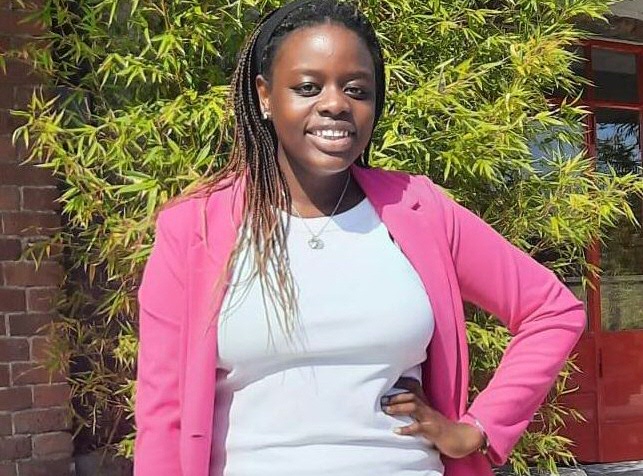
After completing my bachelor's degree in Uganda, my primary objective was to further my knowledge in the field of demography, which led me to pursue the Master's programme Population Studies at the University of Groningen. Upon my arrival in Groningen, the Netherlands, I initially faced unfamiliarity with the university's system and operations.
Fortunately, I received invaluable assistance from professors and approachable students, enabling me to quickly adapt to the intricacies of the university's functioning.
The University of Groningen employs cutting-edge technology, ensuring seamless navigation through campus programs such as lectures, exams, and registration. Moreover, the provision of timely email reminders for important tasks minimizes the risk of missing crucial deadlines. I am particularly grateful for the exceptional support extended by Billie de Haas, the head of the department, who diligently assisted me in overcoming various challenges. Even when faced with problems for which immediate solutions were unavailable, she promptly directed me to the appropriate resources.
The university community possesses commendable proficiency in English, facilitating effective communication. This linguistic advantage ensures that individuals encountered during my time at the university were capable of engaging in meaningful dialogue. The students themselves are not only adept communicators but also reliable friends, always willing to offer assistance both inside and outside the classroom. Furthermore, the student ncommunity regularly organizes events designed to foster connections among peers and staff members. Such initiatives create an open and approachable atmosphere, facilitating interactions with faculty and fellow students.
Among the many courses offered, two notable ones are "Qualitative Research Methods for Policy and Practice" and "Qualitative Research Method." These courses provide valuable insights into complex social phenomena, human behavior, and lived experiences. Widely employed in disciplines such as sociology, anthropology, psychology, education, and healthcare, qualitative research utilizes rigorous and systematic approaches to data collection, analysis, and interpretation. It helps uncover profound meanings and understand the diverse perspectives of individuals and communities.
However, it is important to address the housing predicament faced by students. The demand for accommodation exceeds the available supply, posing challenges in securing suitable living arrangements. As an international student from a non-EU country, I encountered difficulties in finding housing. While numerous housing options can be found online, exercising caution and prudently selecting trustworthy sources becomes imperative.
- Delilah Namutebi
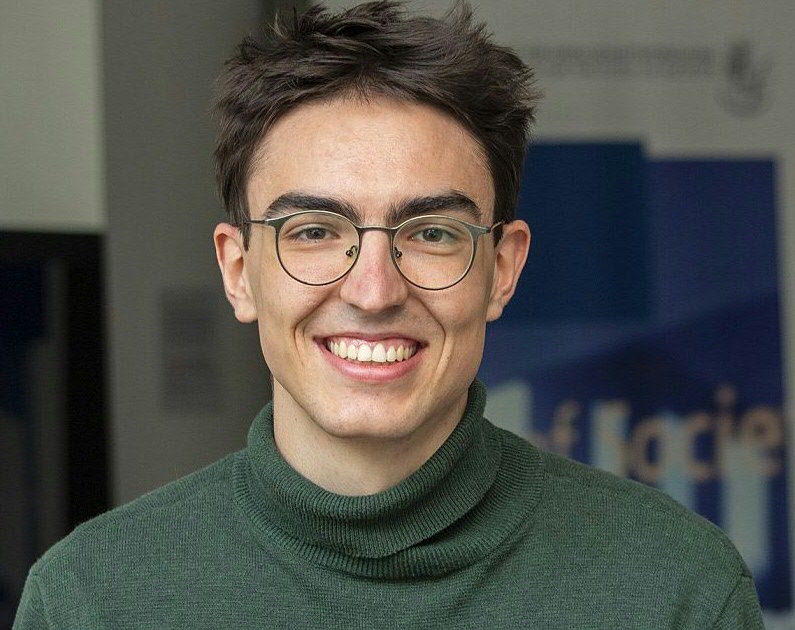
The Master Population Studies (for me as part of the DDM Demography and Social Inequality) provides students with tools to observe and model population dynamics, explicitly considering the role of spatial context. Coming from the field of (micro-)sociology, I especially benefitted from insights into macro-level processes interacting with (and informing) individual-level decision-making.
Also, having a mainly quantitative research background, I was interested in how statistics could be enriched through a more qualitative, conceptually rich perspective – and how the findings we produce as researchers can be taken up for policy-advice and public opinion- and decision-making.
At the Population Research Centre you find both; empirically open, qualitative research aiming to understand individuals’ living environment and thought processes, and quantitative research allowing generalization to a broader population. The idea that the research we conduct needs also to able to inform political decision-making and should be translated for a broader audience is strongly engraved in the spirit of the programme.
At the same time, the interdisciplinary and international setting at the faculty has provided me with an opportunity to grow – also personally. I have studied alongside students from all over the world, providing their unique perspective and experiences going beyond the German-Dutch context I was used to. Additionally, especially within the context of the one-year master and the four-block-system common in Dutch higher education institutions, students are really asked to coordinate tasks arising from the requirements of the various courses.
At the same time, the wide array of topics covered in lectures, seminars and workshops at the faculty of spatial sciences itself and at other faculties (in which students can take part within the context of elective courses) allows students to get a broad overview of promising areas of research and develop their own research interest. This experience has further encouraged me to pursue a career in academia and a PhD.
- Elias Hofmann
Photo credits: MPIfG/AD
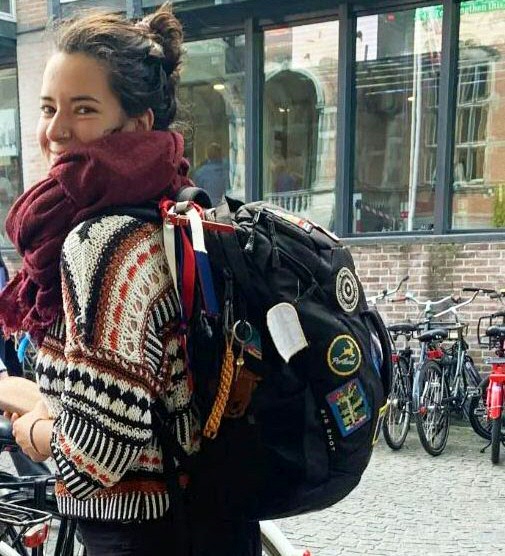
After finishing my bachelor's degree in statistics, studying Population Studies as part of the Dual Degree Master's (DDM) in Social Demography (University Pompeu Fabra & University of Groningen) was the best combination to link my interest in social sciences with my existing academic background. Through new inspiring perspectives brought by its broad international context and great professional possibilities, this DDM is perfect for those who want to develop new skills for social sciences.
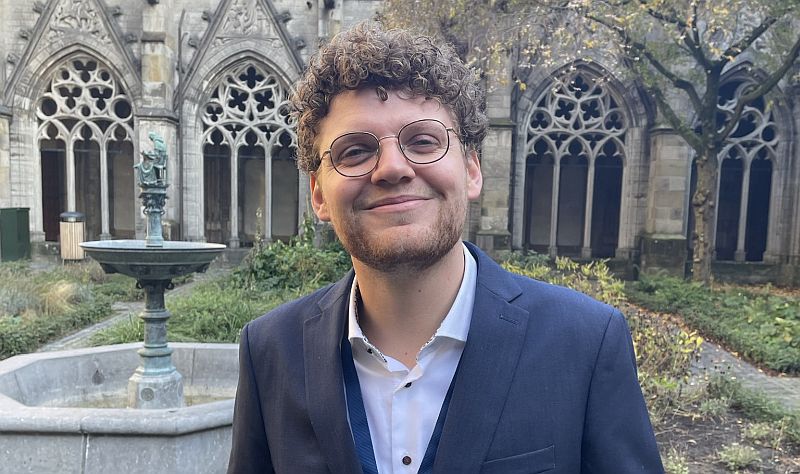
After completing my bachelor's degree in Human Geography and Planning at the faculty of Spatial Sciences, I wanted to specialize in demography and population dynamics. That's why I chose to start with the Master's in Population Studies. I genuinely enjoyed the courses in the programme and found them to be incredibly insightful. The range of topics covered was diverse, offering both breadth and depth of knowledge.
Despite the diversity of subjects, the courses managed to maintain a good level of depth, ensuring a solid understanding of each topic. Furthermore, the courses included field trips to organizations and companies in our field of work and to conferences related to our studies, such as the Dutch Demography Day.
What made the experience even better was the cohort of around 20 students. This close-knit community created an environment where everyone knew each other by name, transforming classmates into friends and colleagues. It also led to some valuable discussions during lectures, enriching our understanding of the course material.
One notable aspect of the programme was the opportunity for internships. I took advantage of this and completed an internship, which provided practical insights beyond the classroom. This experience not only expanded my practical skills but also played a significant role in helping me secure a job after graduation.
Looking back, the Master's in Population Studies was a valuable step forward for me. It gave me a solid educational foundation, practical experience, and a supportive network. The combination of well-structured courses, a tight-knit community, and real-world exposure has undoubtedly shaped my academic and professional journey in a positive way.
- Wout van Hoorn
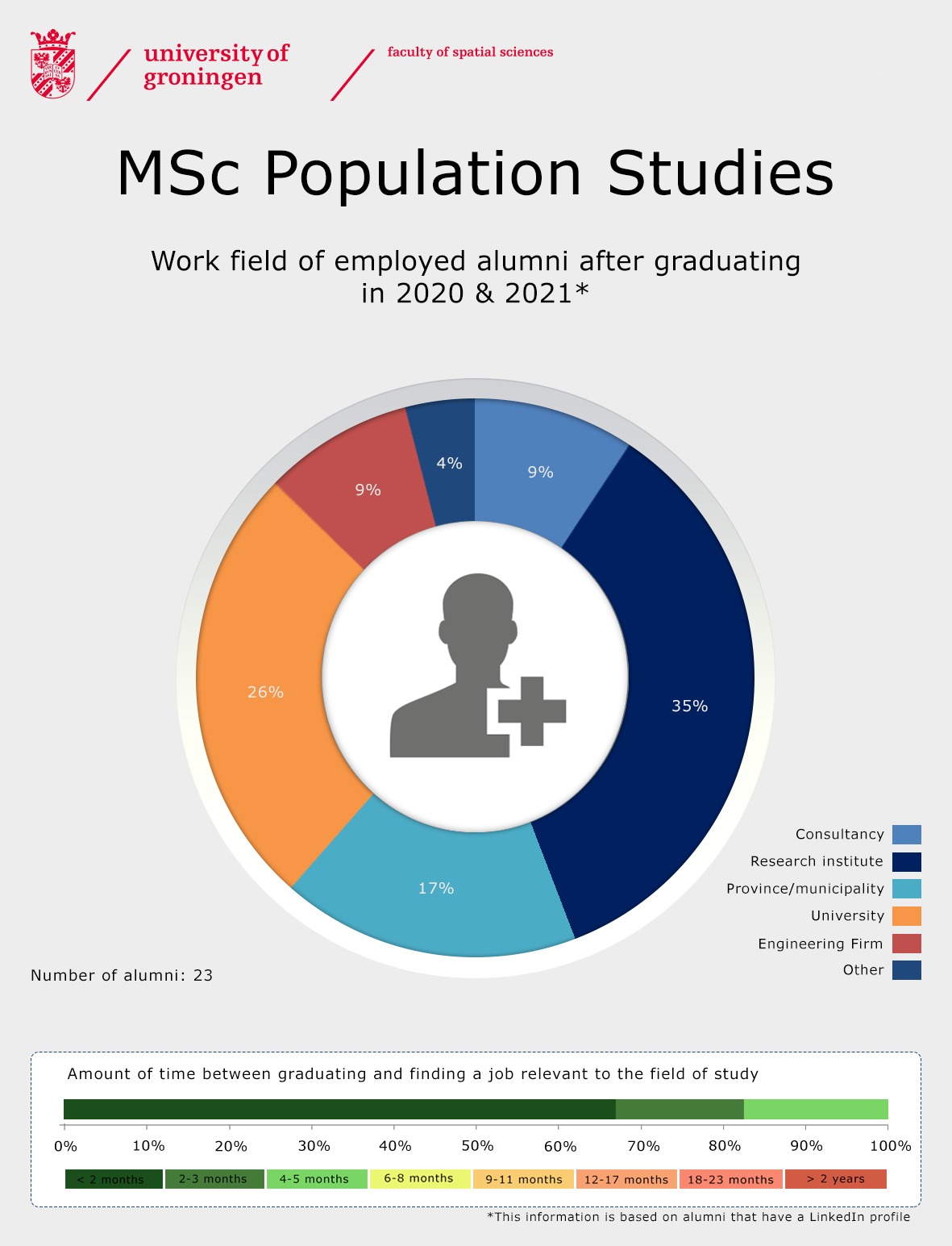
This infographic shows in which workfield alumni of the master's programme ended up, and is based on alumni who graduated between 2022 and 2024. As is visible, the majority of the alumni have found a job relevant to their field of study within 6 months since graduating.